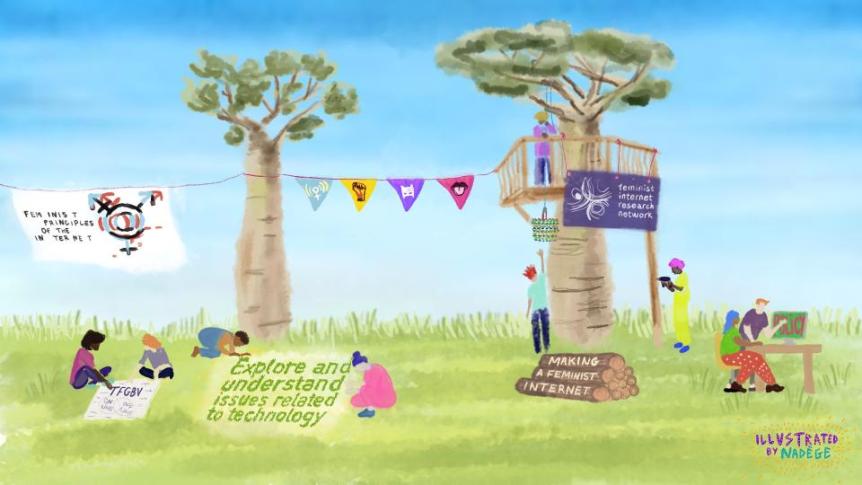
Technology-facilitated gender-based violence (TFGBV) is any act that is committed, assisted, aggravated or amplified by the use of information communication technologies or other digital tools, that results in, or is likely to result in, physical, sexual, psychological, social, political or economic harm, or other infringements of rights and freedoms.1 TFGBV has the same roots as other forms of gender-based violence (GBV) and is part of the same continuum. Online and offline GBV does not happen in separate vacuums, as women and gender-diverse people’s lives online intersect frequently and in various complex ways with other areas of their lives, and violence in any one domain can often produce harm across other domains.
At APC, specifically through the Women’s Rights Programme, we have been working at the intersection of digital rights and women’s rights for almost 30 years, and for the last 10 years, TFGBV has become a priority issue on the agenda of the rights of women and people of diverse genders and sexualities. For the past year, APC has been working and collaborating in different multistakeholder spaces such as the Global Partnership for Action on Gender-Based Online Harassment and Abuse in order to collaborate and effectively address TFGBV through a multistakeholder approach, together with governments, United Nations agencies, civil society and academia.
Roundtable for a Call to Action
Among the activities of the 68th session of the UN’s Commission on the Status of Women (CSW) which took place in March 2024, APC together with the Government of Australia, the Government of the United States of America and the Government of Canada as well as UNFPA, UN Women, The Asia Foundation (TAF) and the National Democratic Institute (NDI), joined to host a roundtable on 11 March 2024 to convene a collaborative response to effectively address and end TFGBV. The high-level parallel event was called "Collective action to address technology-facilitated gender-based violence: A call to action".
This event provided a platform for technical exchange to identify and promote interventions which specifically address TFGBV experienced by women and people of diverse genders and sexualities, as well as to determine gaps and opportunities for dedicated funding and resources. Before the event, there had been various collective efforts to explain the importance and to highlight TFGBV as a priority issue. This roundtable was a unique event of its kind as civil society organisations, academia, the private sector, philanthropic organisations, United Nations agencies and governments were able to sit down and draft together a call to action.
Its drafting included a process of consultation during the roundtable, to identify interventions – including national and international rights-based law and policy – and the broader programme of work progressing under the Global Partnership for Action on Gender-Based Online Harassment and Abuse, as well as to propose ideas and innovations to address TFGBV. The input collected in this session was collated as a strategy to move forward collectively.
The resulting Global Call to Action to Address Technology-facilitated Gender-based Violence outlines specific and actionable interventions to address TFGBV in the short term (one year), medium term (three years), and long term (five years). This is a call to all stakeholders across governments, the private sector, the United Nations, civil society, philanthropic organisations and academia to proactively engage in the effort. The call acknowledges that solutions to address TFGBV must be multilayered and intersectional and promote systemic change.
Through overarching principles that must be recognised, it offers actions related to:
- Response mechanisms
- Safety, security and privacy by design as well as inclusion
- Prevention
- Funding mechanisms
- Partnership and collaboration.
Download the Call to Action here.
[1] Definition of TFGBV proposed during the expert group meeting where the Web Foundation, UNFPA, ICRW, WHO and others adopted the conceptual definition by consensus. See: https://www.unwomen.org/sites/default/files/2023-03/Expert-Group-Meeting-report-Technology-facilitated-violence-against-women-en.pdf